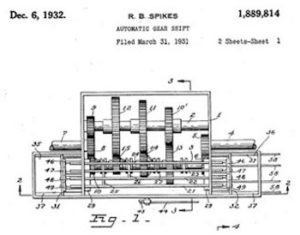Even among people of color, the life and times of barber and inventor Richard Bowie Spikes is obscure. But his life shows us he was a man who came up with solutions to challenges of life.
Spikes was a prolific inventor with more than a dozen patents to his name. Although working on automobiles captured his imagination, Spikes nonetheless improved the operation of items as varied as barber chairs and trolley cars because he worked as a mechanic, a saloon keeper and a barber.
Spikes was born to Monroe and Medora Spikes on October 2, 1878 with six other siblings. The 1880 census lists his birthplace as Texas, though in later years Spikes would report the location as actually being in Indian Territory (later the state of Oklahoma).
“On April 9, 1907, while living in Bisbee, Arizona, Spikes patented a beer-tapper (U.S. Patent number 850,070). Connected to a keg, the tap used tubing to ease the release of beer from the barrel, while also improving freshness over time. This technology was bought by the Milwaukee Brewing Company and its still in use today.
“Spikes’ next invention was for a self-locking rack for billiard cues. He received the patent on October 11, 1910 (U.S. Patent # 972,277), while living in Albuquerque, New Mexico. A decade later, on December 14, 1920, Spikes, now residing in Fort Bragg, California, successfully patented a “trolley pole arrester” (U.S. Patent 1,362,197). According to the patent application, Spikes’ device would automatically pull down the pole when the circuit is broken to prevent the breaking of the trolley wire and injury to the pole.”

“Over the next forty years, Spikes would patent at least seven more items, including a break testing machine in 1921 (U.S. Patent number 1,441,383); a pantograph for conveying electrical current to trolleys wires in 1923 (U.S. Patent number 1,461,988); a combination milk bottle opener and cover in 1926 (U.S. Patent number 1,590,557); a device to obtain average samples and temperatures of tank liquids, for automobiles and industry in 1931 (U.S. Patent number 1,828,753); an improved gear shift transmission system in 1932 (U.S. Patent number 1,889,814); a horizontally swinging barber’s chair in 1950 (U.S. Patent number 2,517,936); and, finally, an automatic brake safety system in 1962 (U.S. Patent 3,015,522) at the age of 84,” Blackpast reported.
By the time he was creating the automatic safety brake in 1962, Spikes eyesight began to fade due to the effects of glaucoma which affected other members of his family so in order to complete the device, he first created a drafting machine for blind designers – by the time his braking device was completed, he was deemed legally blind. The device would soon be found in almost every school bus in the nation.
Spikes’ gear shifting device aimed to keep the gears for various speeds in constant mesh, enhancing the automatic transmission. His automatic brake safety system was also significant; according to the patent application, it provided a reserve braking action in case of damage to the normal braking means and is still used in some buses as a fail-safe means of stopping the vehicle.
Spikes received a patent pertaining to automobile directional signals, which he installed on a Pierce-Arrow car in 1913. However, Percy Douglas-Hamilton was awarded U.S. Patent 912,831 in 1906 for his creation of the first directional signals, six years before Spikes developed his version of the device. For his innovative designs of transmission and gear-shifting devices, Spikes received over $100,000.00, a significant sum at the time.
In 1900, Spikes married Lula B. Charlton. The couple had a son, born in 1902. During the early 1900s, the family moved often, living in Texas, New Mexico, and Arizona, before settling in California.
Spikes died on January 22, 1963 in Los Angeles at the age of 84.










